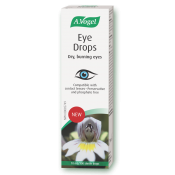How can perimenopause affect your eyes?
As we approach menopause, we're also approaching middle age, a time when it's normal to experience slight eye deterioration anyway. Consequently, it can be tough to differentiate between which issues are due to the aging process and which are due to perimenopause. But one or two eye issues in particular are known to appear during perimenopause, so let's talk about those.
As you approach and enter menopause, your estrogen levels start to fall, which can affect both your eyesight and the appearance of your eyes.
1. Changes in eyesight and eye pressure
During this period, the pressure inside your eyes can change and affect your eyesight, causing it to deteriorate.
You might find that you have to squint a little bit more when you read, or that when you're driving you can't see as far into the distance as you could before. If you've ever had your eyes tested, you'll know that one thing the ophthalmologist will do is check your eye pressure. This is usually done by exposing your eyes to bursts of air.
2. Changes in eye shape
Your eyes can change shape! This may sound horrible, but the change can be very slight. Those of you who wear contact lenses might suddenly realize that your contacts feel really uncomfortable. It's not that you're doing anything differently, but suddenly there's a bit more irritation than usual.
Again, this could be due to perimenopause. If this is the case for you, go get tested for new contact lenses.
3. Dry eyes
You might experience dry eye, a really big issue during perimenopause. Your eyes are made up of tissues called mucous membranes. Mucous membranes are found throughout your body—in your digestive tract, your lungs, your mouth, your bladder and your vagina—and can be seriously affected by falling estrogen levels.
They tend to become drier, which can cause a lot of discomfort. If you're not producing tears to moisturize your eyes, then blinking can become more uncomfortable and you might feel like you've got gritty eyes, and that can affect your vision as well.
4. Watery eyes
At the opposite end of the spectrum, you can end up with very watery eyes. If you're in perimenopause, for example, your estrogen levels are going to fluctuate. This can affect your periods—they can become heavier or a little more frequent—and for some reason, it might also impact your eyes.
Sometimes the weather changes at the drop of a hat, suddenly getting very windy, very cold or very sunny. When this happens, my eyes start tearing, which is annoying to say the least—it looks as though I'm crying as I walk down the street, when in fact, my eyes are just producing extra tears to protect themselves from the harsh conditions.
5. Tired eyes
You may also have tired eyes, especially if you're working on a computer all day or spending a lot of time in front of screens. Your eyes can become really, really tired, which can cause problems with focus. You might find that your eyes take a little bit longer to focus when you shift from looking at things close up to seeing at a distance.
Other eye conditions to be aware of
Other eye conditions to watch out for include glaucoma, cataracts and something called age-related macular degeneration. I'm not suggesting any herbal remedies this time around because these conditions are beyond our remit—they're some really serious eye conditions, so don't attempt to treat them at home with herbal remedies or over-the-counter medications.
Instead, get these issues diagnosed by your healthcare professional or eye specialist.
How to take care of your eyes during perimenopause and menopause
Get your eyes tested regularly
The most important thing you can do is to have regular eye check-ups, even if you've never needed them before. An optometrist will do things like check right inside your eyes, measure their pressure and check their range of motion. For those of you who wear glasses, you might find that your eyesight is changing a lot faster than in the past. If you experience any of the above-mentioned symptoms, schedule an extra eye test in between your usual annual or biennial eye appointments.
Balance your hormones
For those of you suffering from low estrogen symptoms too, have a look at our MenoSupport Complex, which is known to very gently raise and balance low estrogen levels.
Support your eyes
We also make a wonderful eye support supplement called Sharp Vision. It contains extracts of foods and flowers that are high in compounds called lutein and zeaxanthin, which are known to help to stabilize and support the eyes. It's a good option if you want to do some support work for your eyesight over the next couple of years.
Eye drops
If your eyes are really dry and gritty, you could try our Eye Drops. These are great because they're vegan and contain absolutely no preservatives. They're also suitable for those who wear contact lenses on a daily basis.
My top tip:
Our extra-moisturizing Eye Drops help soothe eyes and keep them lubricated. To help relieve dry eye, put 1 drop in each eye up to 5 times a day.
Omega 3s
Make sure to get enough Omega 3 fatty acids in your diet. You get it from things like oily fish (salmon, mackerel), and if you're a vegetarian or vegan, consider things like flaxseed oil or our VegOmega-3.
Eat brightly coloured foods
Brightly coloured foods contain compounds such as lutein and zeaxanthin, along with vitamin A. They include all sorts of great veggies like carrots, beets, bell peppers and tomatoes.
We also make a tasty fermented carrot juice. While it may sound a bit strange, it tastes great and is something you can have daily to boost your vitamin A levels a bit, or just because you love it!
Zinc
Consider zinc too. It's really important for eye health—you'll need a daily supplement that provides around 15 mg of zinc.
Water
Last, but by no means least: water. Remember that during perimenopause and menopause, women get extra dehydrated. Dehydration will affect your eyes, contributing to dry eye and affecting your eye pressure. Drinking 1.5 litres of plain water a day can be beneficial to your eyesight.
I hope you found this topic interesting. A lot of you, especially those of you in perimenopause, can prepare and support your eye health even before any changes





